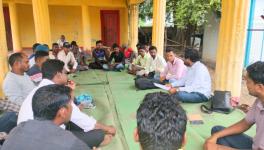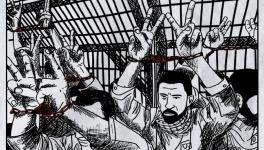Karnataka: Nagarhole Tribal Communities Fight for Re-entry to Their Forest Homes
Image Courtesy: Wikimedia Commons
Tribal communities from the Nagarhole National Park have been protesting since March 15 for re-entry to their forest homes. More than a decade ago, they were induced to vacate the forest with incentives like Rs 10 lakh cash and a three-acre plot of land. However, they have grown disillusioned with their new surroundings and have yet to find regular work to support themselves.
When they try to re-enter their forest home to worship their ancestral gods and deities, they are denied permission. The tribals allege that when they managed to enter the forest last year, they were rounded up and severely beaten by police and forest department officials.
Even today, several indigenous communities live in National parks and Tiger reserves across India. Clashing with the interests of indigenous communities in Nagarhole national park are coffee estate owners, private wildlife business lobbies and the forest department.
The militant youth among indigenous communities have joined to form Community Networks Against Protected Areas (CNAPA).
The organisation has drawn in young activists from communities that reside in Tiger Reserves like Kaziranga (Assam), Nagarhole (Karnataka), Rajaji (Rishikesh), Mudumalai (Tamil Nadu), Gir (Gujarat) and many others. They have been demanding land rights for indigenous communities, guarantees against future displacement, and public services like roads and schools in their region.
Soudamma, 39, is a member of the Jenu Kuruba tribe. Among other things, the tribe is skilled at extracting honey from trees. She relocated from her village in Nagarhole National Park in 2011. She was resettled in another village on the edge of the forest around 70 km from her original home.
Speaking to NewsClick, she says, “Only 20 out of the 42 families in our hamlet were ready for resettlement. I was not prepared to leave. Our family was forcibly evicted from the land by threats of home demolition. The forest department officials scared us that they would release tigers and elephants in our region. We were relocated to the edge of the forest and given a home. My children go to work in the coffee plantations of Kodagu and earn Rs 300/day. I am not getting any work (in the resettlement camp). I want to go back to our home in the forest. They promised us Rs 10 lakh/family but deducted Rs 7 lakh for the new land and house. Some people have received as little as Rs 1.5 lakh.”
Soudamma has three children, including two sons and a daughter. Neither of her sons has completed SSLC (10th standard). Her daughter is studying PUC (11th standard).
She continues, “What hurts us is that they lied to us. They told us they would allow us to visit our sacred sites and burial grounds. Now they stop us from entering the forest. We need at least one month to go and visit all our sacred places. Last year, we managed to enter the forest and spend two months there. The forest department officials were furious when they found us. As we were cooking, they kicked and overturned the rice utensils. They took us to our resettlement camp, locked us up in the community centre for one day, and beat everyone mercilessly.”
FIVE-DAY PADAYATRA TO RAISE AWARENESS
The indigenous communities undertook a five-day padayatra from Nagarhole to Bengaluru to raise awareness about the protests in Nagarhole. The padayatra culminated on March 20. Adivasis from Nagarhole informed NewsClick that the protests in Nagarhole are not centralised or taking place on a single site. Protests are taking place across the forest. As per reports, an estimated 1700 families lived in Nagarhole National Park in 2001. That number has dwindled over the years.
Shivu, a young member of the Jenu Kuruba tribe, says that they have formed a local association.
Addressing a press conference in Bengaluru, he says, “Between 1983 - 1996, many indigenous communities were forcibly evicted from the forests without giving any compensation. Without taking our consent or the consent of gram sabhas, they have turned our homes into Tiger reserves and protected areas. Many people who cannot adjust to the new environment are dying at a young age. Our culture and identity are being erased. For all these years, we have coexisted with nature, animals, and the forest. Our traditional knowledge has helped us survive and protect each other.”
On March 22 and 23, the CNAPA held a two-day seminar at the Indian Social Institute, Bengaluru, where adivasis from different national parks spoke about their experiences and issues. Delegates from Arunachal Pradesh, Tamil Nadu, Uttarakhand, Assam, Odisha, Gujarat and Karnataka participated in the seminar.
Get the latest reports & analysis with people's perspective on Protests, movements & deep analytical videos, discussions of the current affairs in your Telegram app. Subscribe to NewsClick's Telegram channel & get Real-Time updates on stories, as they get published on our website.
























